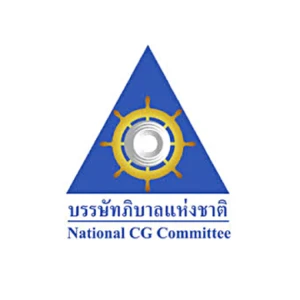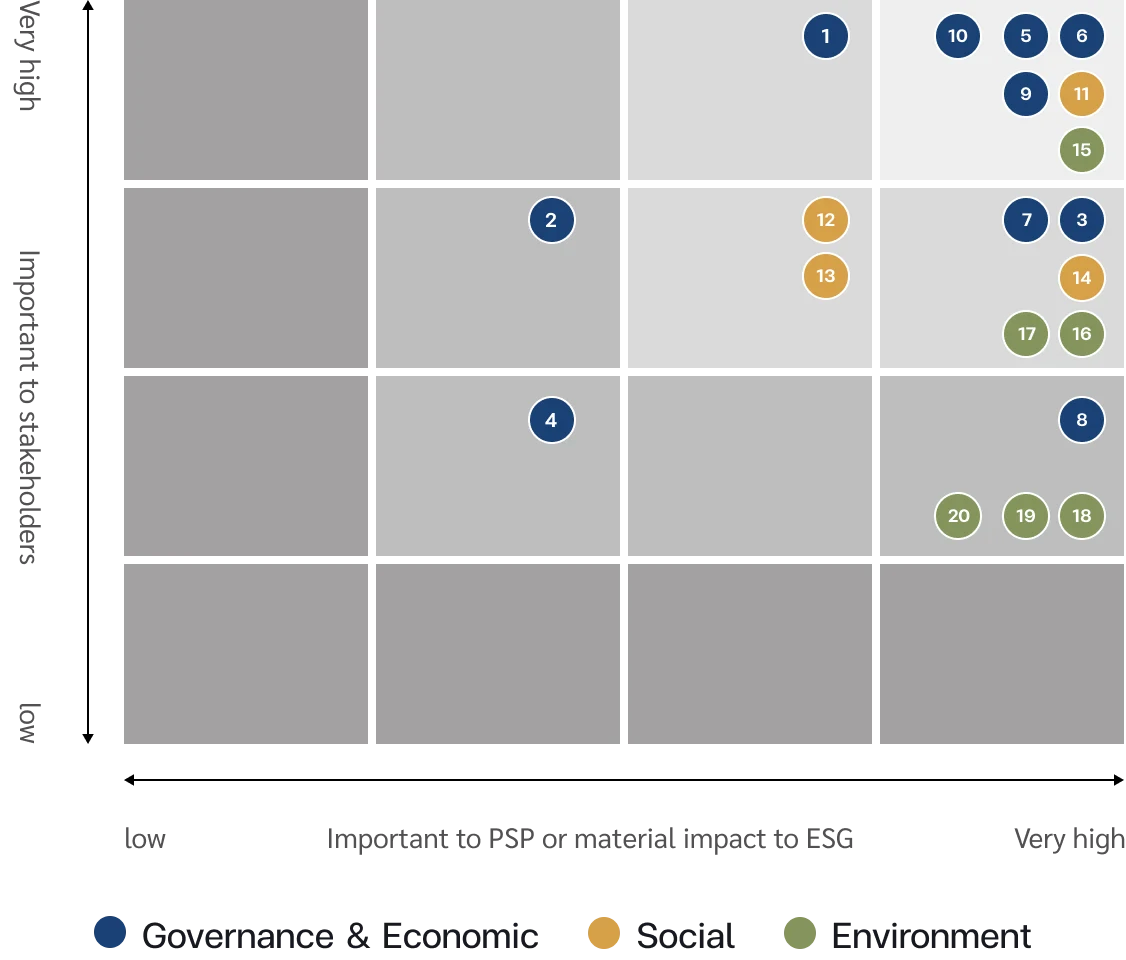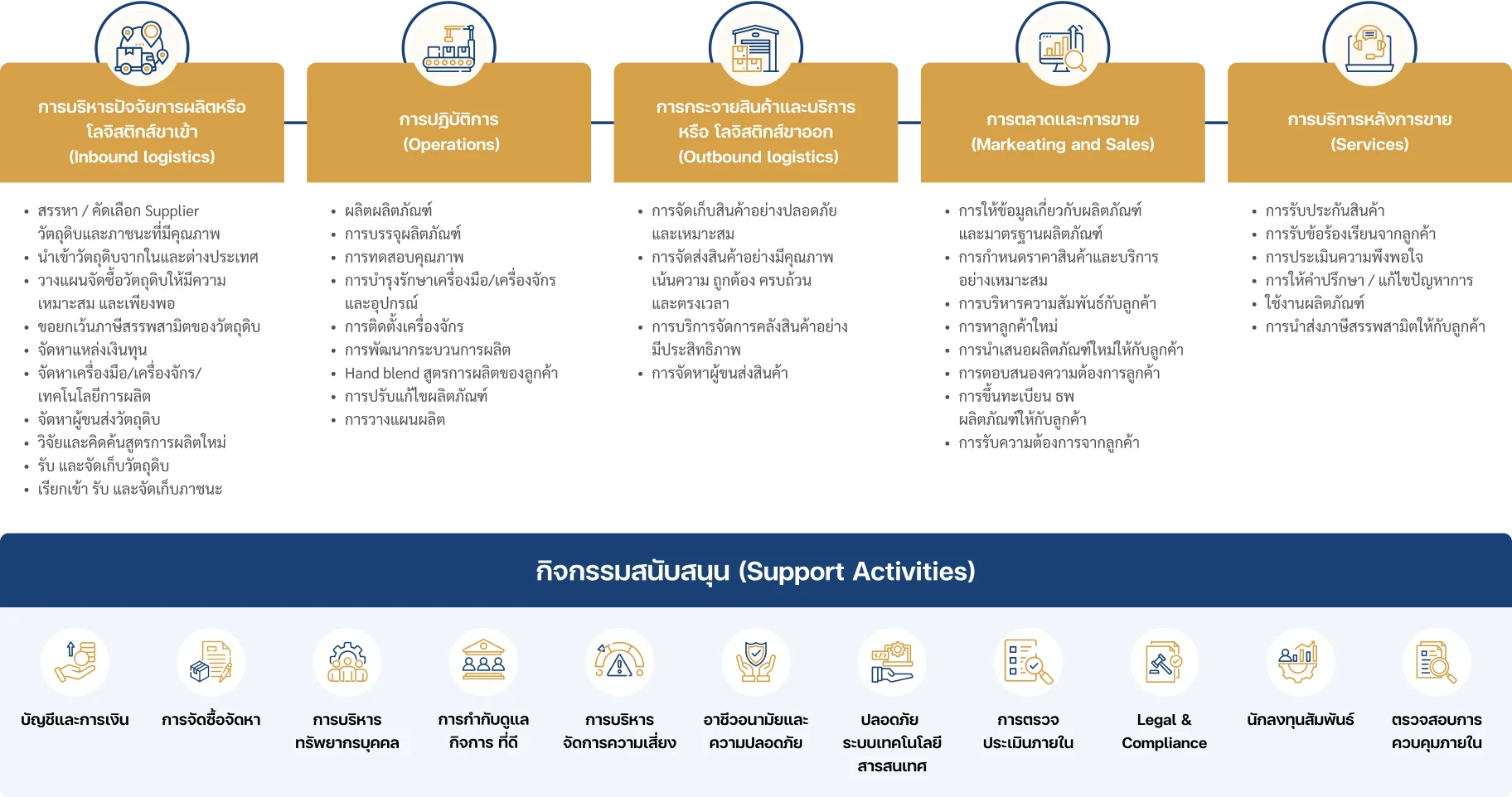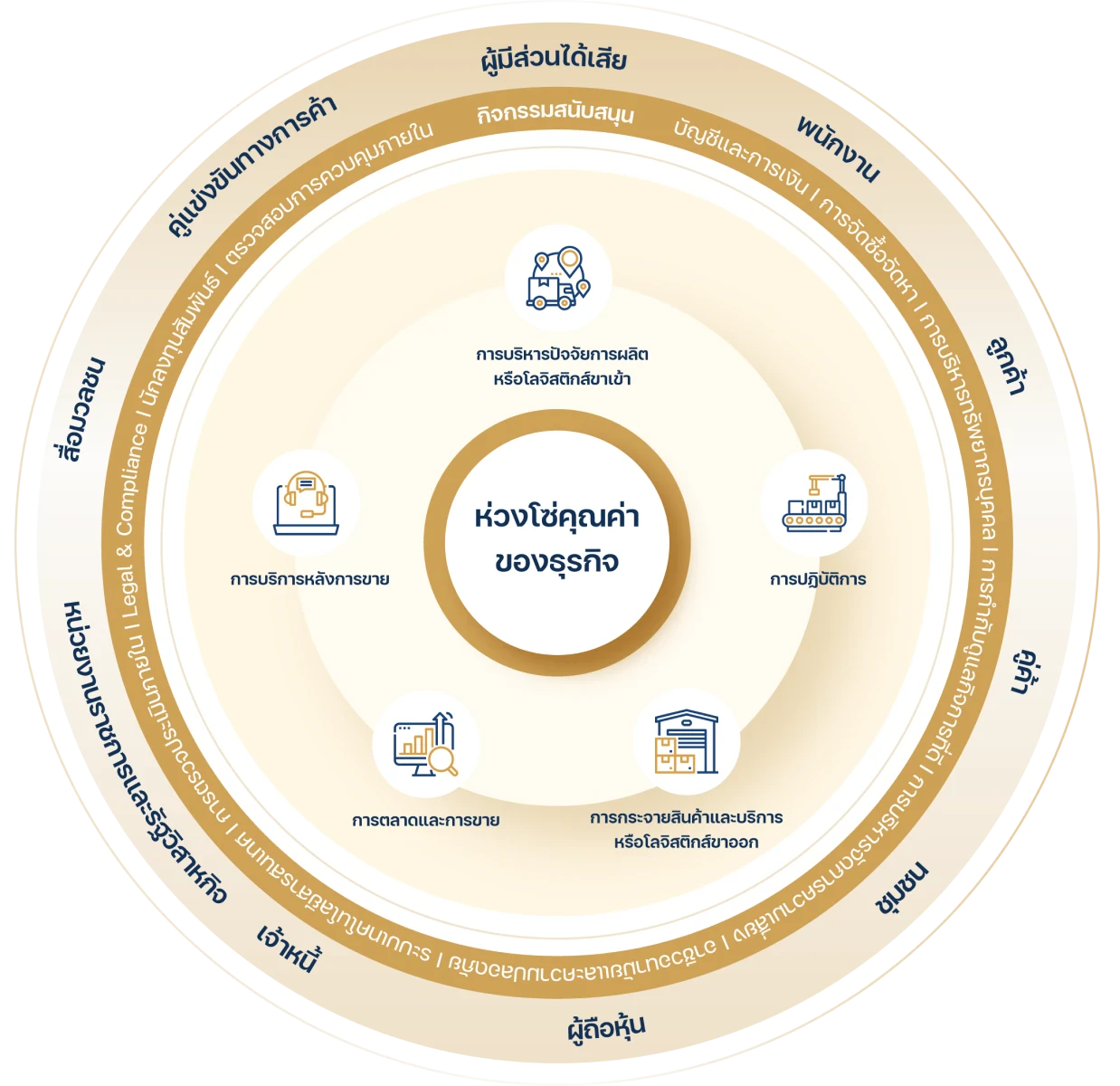The Company is committed to conducting its business through sustainable management, firmly upholding ethics and corporate governance principles, while aiming to enhance the quality of life for communities through the vision: “A leader in the comprehensive production of lubricants, ready to take every opportunity for sustainable and unrestricted growth.”
This commitment is carried out through enterprise risk management in alignment with corporate governance principles, including consideration for the interests of all stakeholders. The Company aims to promote sustainable business growth in accordance with the Global Reporting Initiative Standards (GRI Standards) and considers alignment with the Sustainable Development Goals (UN SDGs) as key to delivering value to society.
The Company has formulated a clear strategy and implementation plan, including the establishment of a Sustainable Development Steering Committee & Working Committee to ensure continuous and effective sustainability performance at the organizational level. This structure supports alignment with the Company’s objectives and strategic goals, with contributions and collaboration from everyone in the organization.
Strategies and Operational Framework for Corporate Sustainable Development
In 2024, the Company developed its corporate sustainability framework to support the Company’s growth toward sustainable development goals, with a target set for 2029. This initiative is driven by three core strategic framework, as follows:

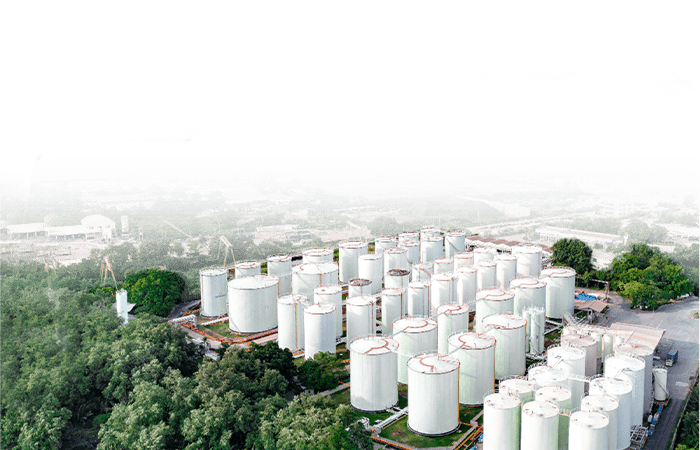
Sustainable Development in the Economic and Governance Dimensions
Committed to continuous improvement, development, and adaptation of the business.
การพัฒนาเทคโนโลยีและผลิตภัณฑ์หล่อลื่นครบวงจรที่ครอบคลุมห่วงโซ่คุณค่าของธุรกิจ พร้อมการต่อยอดทุกโอกาสทางธุรกิจพัฒนา และปรับตัวให้รับได้กับทุกความเสี่ยงอย่างต่อเนื่อง เพื่อการเติบโตอย่างยั่งยืนและไร้ขีดจำกัด (Business Development and Resilience)

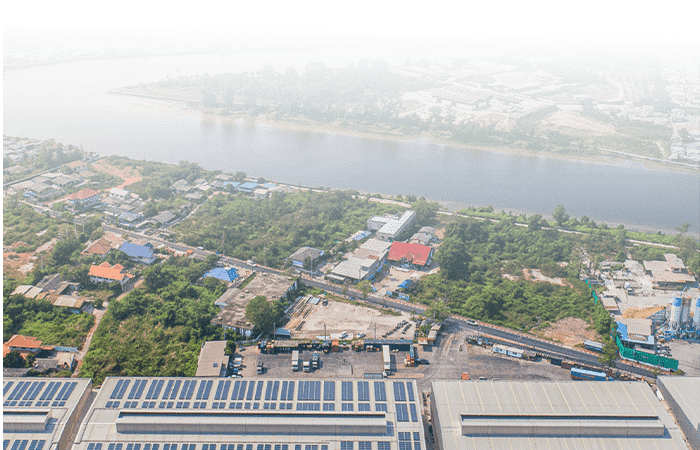
Sustainable Development in the Environmental Dimension
Focused on utilizing resources to their maximum benefit in accordance with the principles of the circular economy.
บริษัทฯ จะดำเนินกระบวนการในการส่งมอบคุณค่าของสินค้าและบริการบนพื้นฐานของการใช้ทรัพยากรให้เกิดประโยชน์สูงสุด ตามหลักเศรษฐกิจหมุนเวียนและเข้าใจคุณค่าของการใช้ทรัพยากรให้เกิดประโยชน์สูงสุด (Value Consumption and Circular Economy)

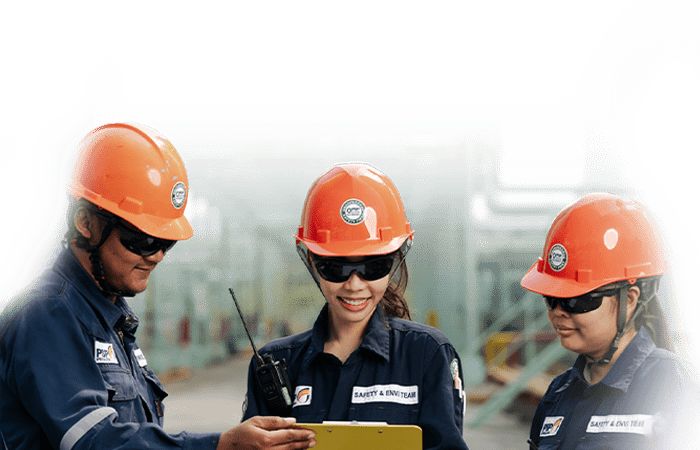
Sustainable Development in the Social Dimension
Developed skills, knowledge, and understanding within the organization’s human resources, aiming for inclusivity and fostering participation with stakeholders.
บริษัทฯ พัฒนาทักษะความรู้และความเข้าใจในองค์กรของทรัพยากรมนุษย์มุ่งสู่ความเป็นเลิศ พร้อมสร้างการมีส่วนร่วมกับผู้มีส่วนได้ส่วนเสีย (People Development and Excellence)
The Organization’s Sustainability Development Goals
In 2024, the Company developed its corporate sustainability framework to support the Company’s growth toward sustainable development goals, with a target set for 2029. This initiative is driven by three core strategic framework, as follows:
Corporate Governance
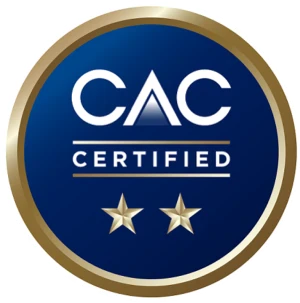
Enterprise Risk Management
Business Development and Resilience
Innovation Transformation
Product & Service Stewardship
Supply Chain Management
GHG Management
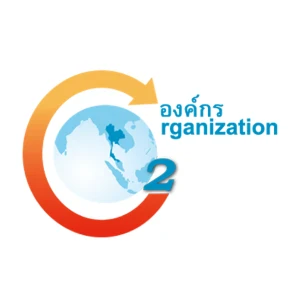
Energy Management
Water and Effluents
Waste Management
Biodiversity
ESG Compliance
Operational Framework for Corporate Sustainability Development
The Company has established a framework for implementing its sustainability development efforts to drive progress toward its 2030 sustainability goals. The framework is divided into three key pillars: Economic, Social, and Environmental. This approach aligns with the Company’s vision to be a leading manufacturer of fully integrated lubricants, ready to take every opportunity for sustainable and unlimited growth.
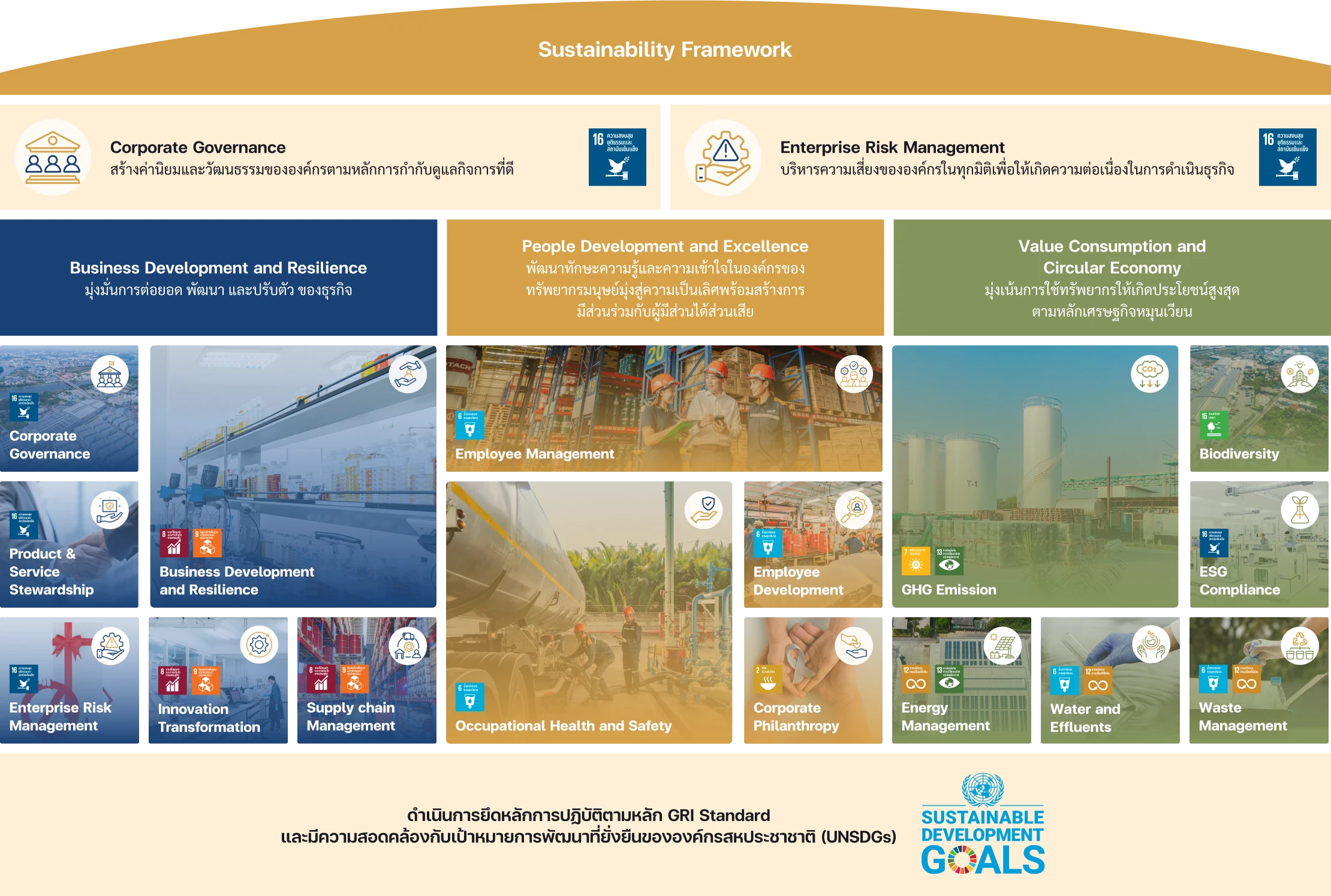
Operational Framework for Corporate Sustainable Development
Short Term
Establish the Foundation and Define Operational Guidelines
- Set sustainability goals aligned with the organization’s strategy and international standards.
- Develop and revise ESG-related policies, including the establishment of risk management mechanisms.
- Establish guidelines for stakeholder engagement and addressing complaints and concerns.
- Promote organizational values and culture that encourage social and environmental responsibility.
Medium Term
Develop Capabilities and Integrate Operations into Regular Practice
- Adopt circular economy principles and greenhouse gas emission reduction into business operations in line with national and international standards.
- Expand sustainable supply chain management practices to key partners across the value chain.
- Promote human resource development and enhance workforce competencies through upskilling and reskilling programs aligned with sustainability strategy.
- Integrate innovation and digital technology to strengthen ESG performance in terms of qualitative and quantitative data.
Long Term
Strengthen and Establish Leadership in Sustainability
- Aim to become a Net Zero Emissions organization in line with global standards.
- Develop environmentally friendly innovations and products that meet long-term sustainability needs.
- Elevate corporate governance (CG) standards to industry-leading levels.
- Expand collaboration with international and regional networks to build a resilient and sustainable business ecosystem.
Materiality Assessment for Corporate Sustainable Development (PSP Materiality Matrix)
Sustainability material topics are prioritized and assessed based on the principles of the Global Reporting Initiative (GRI) Standards. The assessment considers the organization’s impacts and consequences on the economy, environment, and society, as well as the concerns and expectations of key stakeholders. The results of the materiality assessment will be reviewed and approved by the Company’s Board of Directors and are presented in detail as follows:
Material Topics
Governance & Economic
- 1 Corporate Governance and Business Ethics
- 2 Anti-corruption
- 3 Risk Management & Business continuity management
- 4 Conflict and security
- 5 Business Development and Resilience
- 6 Innovation
- 7 Process Improvement
- 8 Tax Management
- 9 Procurement Practices & Supplier management
- 10 Customer and Product Stewardship
Social
- 11 Occupational health and safety
- 12 Employee Management
- 13 Employee Development
- 14 Corporate Philanthropy
Environment
- 15 GHG emissions
- 16 Energy Management
- 17 Water and Effluents
- 18 Waste Management
- 19 Biodiversity
- 20 ESG Compliance
Business Value Chain
The Business Value Chain is a key component supporting the organization’s journey toward sustainable growth. It covers all processes from sourcing raw materials, production, and distribution to delivering products and services to customers. Within the scope of sustainability, an organization must manage its value chain efficiently, taking into account its economic, social, and environmental impacts, while fostering collaboration with stakeholders affected throughout the chain.
Operating sustainably within the value chain not only reduces risks and increases efficiency in business operations but also enhances organizational resilience, competitiveness, and long-term value for stakeholders. To this end, the Company focuses on developing transparent, ethical, and environmentally responsible processes to ensure that the value chain supports sustainable and inclusive business growth, as detailed below.
PSP Stakeholders Engagement Analysis
The Company has established a stakeholder management framework (Management Framework: Stakeholder Analysis) by referencing the guidelines outlined in the GRI Standard version 2021. Each department is responsible for identifying and analyzing stakeholders relevant to its own operations and to PSP’s overall value chain. And it is also tasked with classifying and prioritizing stakeholder groups of PSP. The results of this analysis are presented in detail as follows:
Channels for Engagement
- Internal communication
- Town Hall meetings between executives and employees
- Monthly staff meetings
- Communication via online platforms, intranet, and email
- Welfare committee meetings
- Annual employee engagement surveys
- Establishment of complaint and grievance channels
Topics of Concern for Stakeholders
- Business direction
- Company performance
- Corporate business ethics
- Employee quality of life
- Fair compensation, welfare, and benefits
- Healthy and safe working environment
- Employee potential development
- Equal and non-discriminatory practices
Relevant Sustainable Development Issues
- Corporate governance
- Business ethics
- Anti-corruption practices
- Innovation and product development
- Employee care and well-being
- Human resource development
- Occupational health and safety
- Human rights
Channels for Engagement
- Annual customer satisfaction surveys
- Customer relationship and marketing activities
- Direct meetings and consultations with customers
- Online and email communication
Topics of Concern for Stakeholders
- Risk and crisis management
- After-sales service
- Customer relationship management
- Environmental management
- Response to customer complaints
- Customer data confidentiality protection
- Equal and non-discriminatory practices
Relevant Sustainable Development Issues
- Customer and product stewardship
- Innovation and product development
- Greenhouse gas emissions
- Environmental management (e.g., water, energy, and waste)
- Legal compliance
- Human rights
Channels for Engagement
- Communication via online platforms and email
- Direct meetings and consultations
- Channels for receiving suggestions or complaints
Topics of Concern for Stakeholders
- Corporate governance
- Business ethics
- Fairness in business operations
- Transparent and equitable procurement processes
- Confidentiality of partner and vendor information
- Equal and non-discriminatory practices
Relevant Sustainable Development Issues
- Supply chain management
- Corporate governance
- Anti-corruption practices
- Occupational health and safety
- Legal compliance
- Human rights
Channels for Engagement
- Community Relations Activities
- Communication via online platforms and email
- Other communication channels for receiving suggestions or complaints
Topics of Concern for Stakeholders
- Good Relations with the Community
- Compliance with social and environmental laws
- Improvement of community and societal quality of life
- Building networks for collaborative community and social development
Relevant Sustainable Development Issues
- Community Involvement
- Social contribution activities
- Legal compliance
Channels for Engagement
- Board meetings in subsidiaries and joint ventures
- Investment information disclosure to the Stock Exchange of Thailand (SET)
- Performance briefing meetings of the Company
- Communication via online platforms and email
Topics of Concern for Stakeholders
- Fair and equitable treatment of shareholders
- Accurate, complete, and timely disclosure of information
- Good corporate governance, including anti-corruption measures
- Strong performance and sustainable business growth
- Effective risk management in business operations
Relevant Sustainable Development Issues
- Corporate governance
- Economic value generated & distributed
- Risk management and business continuity management
- Legal compliance
Channels for Engagement
- Analyst meetings
- Meetings with creditors
- Site visits
- Communication via online platforms and email
Topics of Concern for Stakeholders
- Compliance with loan and debenture conditions
- Risk management
Relevant Sustainable Development Issues
- Business ethics
- Economic value generated and distributed
- Risk management and business continuity management
Channels for Engagement
- Participation in government-initiated projects
- Involvement in working groups of government agencies
- Site visits
- Disclosure of information or reports as required
Topics of Concern for Stakeholders
- Compliance with applicable laws and regulations
- Transparent information disclosure
- Economic value generated and distributed
Relevant Sustainable Development Issues
- Community engagement
- Social contribution activities
- Legal compliance
- Corporate governance
- Anti-corruption practices
- Occupational health and safety
Channels for Engagement
- Press releases / press conferences
- Exclusive interviews upon media request
- Disclosure of information or reports as required
Topics of Concern for Stakeholders
- Receiving complete, accurate, and timely information
- Disclosure of factual and truthful information
- Maintaining good relations with the media
Relevant Sustainable Development Issues
- Corporate governance
- Anti-corruption practices
- Community engagement
- Social contribution activities
Channels for Engagement
- Joint meetings with organizations related to the industry
- Collaborative networking in alignment with government policies
Topics of Concern for Stakeholders
- Fair competition
- Legal compliance
Relevant Sustainable Development Issues
- Corporate governance
- Challenges and opportunities
- Business ethics
- Anti-corruption practices
Driving Sustainable Development Goals
The Company drives sustainable development in alignment with the United Nations Sustainable Development Goals (SDGs), ensuring consistency with global sustainability priorities.
Sustainability Steering Committee and Working Committee
With a strong commitment to becoming a sustainable organization under clear strategies and an operational framework encompassing environmental, social, and governance (ESG) dimensions, the Company has established the PSP Sustainable Development Steering Committee and Working Committee, with the following structure:
เอกสารเผยแพร่


